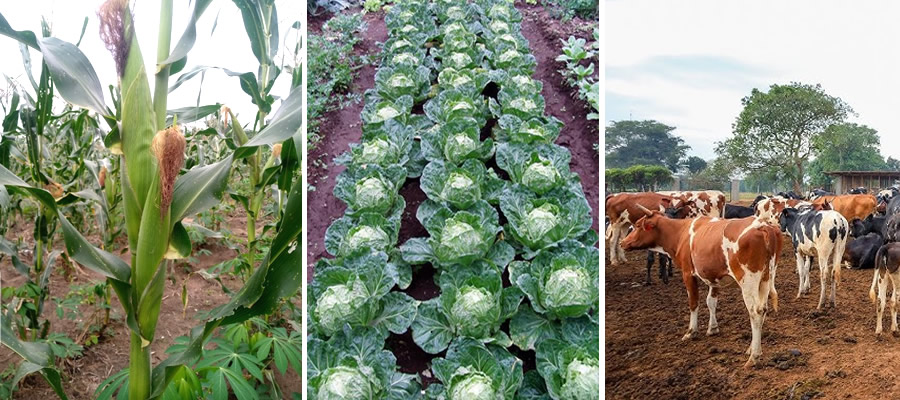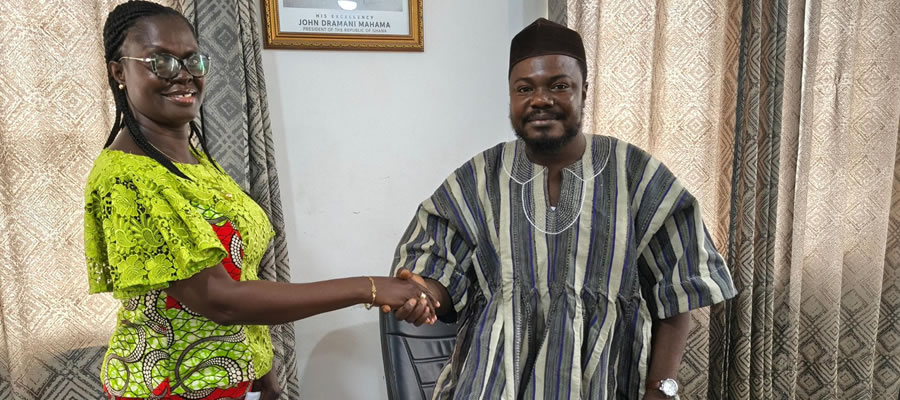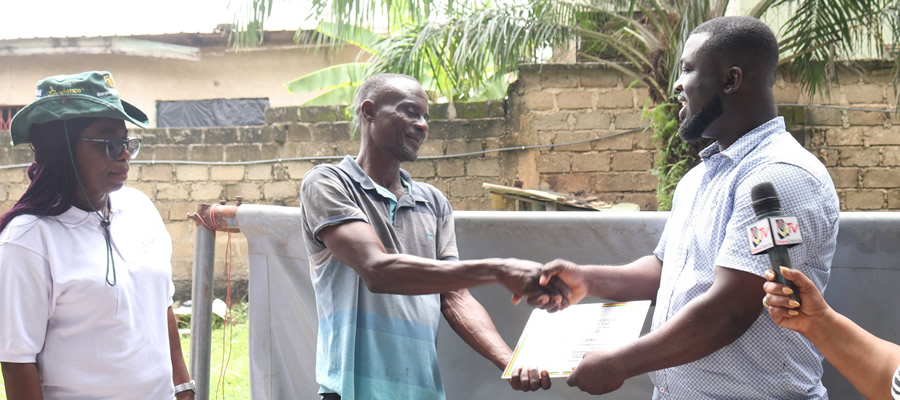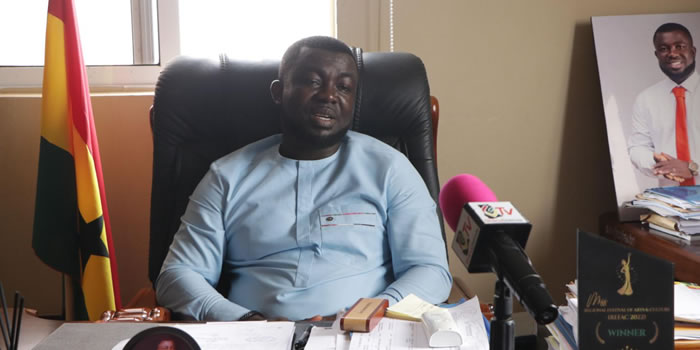

COMMUNITY NEEDS
Social Protection
The District Assembly through the help of the Central Government undertakes some Social Protection Programmes to help address the basic needs of the socially marginalized group of people in the Municipality. Some of these programmes include; the Disability Fund, Livelihood Employment Against Poverty (LEAP), School Feeding and the Free Senior High School Programme, Free School Uniform among others.
Support to Persons Living with Disability (PWDs)
Every year and as stipulated by law (Section 2 of DACF Act, Act 455), 2% of the Common Fund allocation to the MMDA’s are to be used to support Peoples with Disabilities with the aim of addressing the following:
• Minimize poverty among the all PWDs, particular those outside the formal sector of employment
• To enhance their social image through dignified labour.
According to the Social Welfare Department in 2020, there are 102 Persons with Disability registered with the Assembly. Out of this figure, 57 are males and 45 are females. Over the years the support provided to them have varied from Cash Transfers to the provision of Business SetUp Equipment and Materials to enable them start their own economic activity.
For instance, in the 2020 financial year 44 PWD’s (Male, 25 and Female,18) benefited from such Business Set-Up provisions ranging from electronic gadgets such as deep freezers, ovens, grinding machines, popcorn machines. It is hoped that more work need to be done to make the programme more effective to embrace and support all registered PWDs in the Municipality. Additionally, more would have to be done especially in the design of infrastructural facilities to address the concerns of PWD’s. There is also the need to educate PWD’s in knowing their rights and abilities.
Livelihood Empowerment Against Poverty (LEAP)
The government of Ghana has in recent times taken measures to tackle extreme poverty and achieve the United Nations Sustainable Development Goals (SDGs). This prompted the initiation of the National Social Protection Strategy (NSPS) in 2007. The strategy, which represents the Government of Ghana’s vision of ‘creating an all-inclusive society through the provision of sustainable mechanisms for the protection of persons living in situations of extreme poverty, vulnerability and exclusion, consists of three main components designed to tackle extreme poverty;
1. The establishment of a new social grant scheme to provide a basic and secure income for the most vulnerable households.
2. Better poverty targeting of existing Social Protection Programmes.
3. A package of complementary inputs for beneficiaries of Social Protection Programmes.
It is within the third component that the Livelihood Empowerment Against Poverty (LEAP) cash transfer programme was introduced. The LEAP was launched in 2008 as Ghana’s flagship programme of the National Social Protection Strategy. The programme aims at providing cash transfers to the poorest in the country in order to enable them meet their basic needs (food, clothing and shelter), be healthier, enroll their children in school as well as improve their attendance, and adopt strategies to pull themselves out of poverty.
Payment of LEAP is based on the number of beneficiaries in a household. A household with one (1) beneficiary receives GH?64.00. A household with two (2) beneficiaries receives GH?76.00. A household with three (3) beneficiaries receives GH?88.00. A household with four (4) or more beneficiaries receives GHC106.00.
As at December 2020, there had been 112 beneficiaries of LEAP in the Municipality out of which were 90 females representing (80.36%) and 22 males representing (19.64%).
Apparently, the LEAP cash transfer programme has had a significant impact both on beneficiaries and their families, especially in relation to food security, health, education, savings and investments, to promote community development and economic growth.
Institutional Care for the Vulnerable
Even though there are not enough safety nets for the vulnerable, currently there are six privately owned orphanages and child care Homes operating in the Municipality? The others like the aged, disabled and peasant farmers depend on informal social security like support from relatives and borrowing. The Assembly’s participation in the LEAP has provided safety nets to some families who are benefiting. The residential homes in the municipality are: Joy Hill in Fise, Human Compassion Organization in Afiaman and Village of hope at Ayawaso
The Ghana School Feeding Program (GSFP)
The Ghana School Feeding Program is an initiative of the Ghana Government that seeks to enhance food security and reduce hunger, poverty and malnutrition among children of school going age. The basic concept of the program is to provide children in public schools and kindergartens with one hot adequately nutritious meal prepared from locally grown foodstuffs on every school going day. Currently, 29 schools within the assembly are benefitting from the programme with a total enrolment of 12,277 pupils. The program is currently challenged by the delays in payment to the Caterers, and the caterers complain that the feeding fee of GH¢ 0.97/Child is still not enough.
The Nations Builders Corps programme (NABCO)
The Nations Builders Corps is a government initiative to address graduate unemployment by providing temporary employment in the public service and in areas of health, education, agriculture, technology, governance and drive revenue mobilization and collection. As at September, 2020 a total of 328 graduates were benefiting from the programme in the Municipality. This programme had employed graduates in the following module; Revenue Ghana-63, Educate Ghana-15, Feed Ghana-19, Enterprise Ghana-50, Digitise Ghana-59, Heal Ghana-75 and Civic Ghana-47.
Free Senior High School (SHS)
Free Senior High School is an educational policy initiated by the government in the year 2017. This policy was developed with the aim of providing free quality secondary level education to all school going children within the country. It covers the primary and secondary expenditure that caregivers were burdened to provide despite their economic incapability to do so. Within the Municipal, two senior high schools are benefiting from this policy namely; St. John Grammar senior high school and Amasaman Techincal senior high school with a total number of 1,474 students (838 Boy sand 636 Girls).
Capitation Grant
The Capitation Grant was introduced with the intention of facilitating the achievement of the Millennium Development Goal of primary education for all, by financing the primary and Junior Secondary Schools in Ghana in such a way that education is free for all. In 2019/2020 academic year, a total amount of GH¢ 351,801.35 was allocated and a total of 58,704 pupils (29168 boys and 29536 girls) are benefiting.
The National Health Insurance Scheme
The National Health Insurance Scheme is a form of National health insurance established by the Government of Ghana, with a goal to provide equitable access and financial coverage for basic health care services to Ghanaian citizens
Figure 10 provides updates on the use of the National Insurance Scheme at OPD in the Ga North Municipality. As shown the programme was very popular in the years 2018 and 2019. The situation however seems to have change in 2020, a phenomenon that will need further investigations to ascertain the reasons for the drop.

The District Assembly through the help of the Central Government undertakes some Social Protection Programmes to help address the basic needs of the socially marginalized group of people in the Municipality. Some of these programmes include; the Disability Fund, Livelihood Employment Against Poverty (LEAP), School Feeding and the Free Senior High School Programme, Free School Uniform among others.
Support to Persons Living with Disability (PWDs)
Every year and as stipulated by law (Section 2 of DACF Act, Act 455), 2% of the Common Fund allocation to the MMDA’s are to be used to support Peoples with Disabilities with the aim of addressing the following:
• Minimize poverty among the all PWDs, particular those outside the formal sector of employment
• To enhance their social image through dignified labour.
According to the Social Welfare Department in 2020, there are 102 Persons with Disability registered with the Assembly. Out of this figure, 57 are males and 45 are females. Over the years the support provided to them have varied from Cash Transfers to the provision of Business SetUp Equipment and Materials to enable them start their own economic activity.
For instance, in the 2020 financial year 44 PWD’s (Male, 25 and Female,18) benefited from such Business Set-Up provisions ranging from electronic gadgets such as deep freezers, ovens, grinding machines, popcorn machines. It is hoped that more work need to be done to make the programme more effective to embrace and support all registered PWDs in the Municipality. Additionally, more would have to be done especially in the design of infrastructural facilities to address the concerns of PWD’s. There is also the need to educate PWD’s in knowing their rights and abilities.
Livelihood Empowerment Against Poverty (LEAP)
The government of Ghana has in recent times taken measures to tackle extreme poverty and achieve the United Nations Sustainable Development Goals (SDGs). This prompted the initiation of the National Social Protection Strategy (NSPS) in 2007. The strategy, which represents the Government of Ghana’s vision of ‘creating an all-inclusive society through the provision of sustainable mechanisms for the protection of persons living in situations of extreme poverty, vulnerability and exclusion, consists of three main components designed to tackle extreme poverty;
1. The establishment of a new social grant scheme to provide a basic and secure income for the most vulnerable households.
2. Better poverty targeting of existing Social Protection Programmes.
3. A package of complementary inputs for beneficiaries of Social Protection Programmes.
It is within the third component that the Livelihood Empowerment Against Poverty (LEAP) cash transfer programme was introduced. The LEAP was launched in 2008 as Ghana’s flagship programme of the National Social Protection Strategy. The programme aims at providing cash transfers to the poorest in the country in order to enable them meet their basic needs (food, clothing and shelter), be healthier, enroll their children in school as well as improve their attendance, and adopt strategies to pull themselves out of poverty.
Payment of LEAP is based on the number of beneficiaries in a household. A household with one (1) beneficiary receives GH?64.00. A household with two (2) beneficiaries receives GH?76.00. A household with three (3) beneficiaries receives GH?88.00. A household with four (4) or more beneficiaries receives GHC106.00.
As at December 2020, there had been 112 beneficiaries of LEAP in the Municipality out of which were 90 females representing (80.36%) and 22 males representing (19.64%).
Apparently, the LEAP cash transfer programme has had a significant impact both on beneficiaries and their families, especially in relation to food security, health, education, savings and investments, to promote community development and economic growth.
Institutional Care for the Vulnerable
Even though there are not enough safety nets for the vulnerable, currently there are six privately owned orphanages and child care Homes operating in the Municipality? The others like the aged, disabled and peasant farmers depend on informal social security like support from relatives and borrowing. The Assembly’s participation in the LEAP has provided safety nets to some families who are benefiting. The residential homes in the municipality are: Joy Hill in Fise, Human Compassion Organization in Afiaman and Village of hope at Ayawaso
The Ghana School Feeding Program (GSFP)
The Ghana School Feeding Program is an initiative of the Ghana Government that seeks to enhance food security and reduce hunger, poverty and malnutrition among children of school going age. The basic concept of the program is to provide children in public schools and kindergartens with one hot adequately nutritious meal prepared from locally grown foodstuffs on every school going day. Currently, 29 schools within the assembly are benefitting from the programme with a total enrolment of 12,277 pupils. The program is currently challenged by the delays in payment to the Caterers, and the caterers complain that the feeding fee of GH¢ 0.97/Child is still not enough.
The Nations Builders Corps programme (NABCO)
The Nations Builders Corps is a government initiative to address graduate unemployment by providing temporary employment in the public service and in areas of health, education, agriculture, technology, governance and drive revenue mobilization and collection. As at September, 2020 a total of 328 graduates were benefiting from the programme in the Municipality. This programme had employed graduates in the following module; Revenue Ghana-63, Educate Ghana-15, Feed Ghana-19, Enterprise Ghana-50, Digitise Ghana-59, Heal Ghana-75 and Civic Ghana-47.
Free Senior High School (SHS)
Free Senior High School is an educational policy initiated by the government in the year 2017. This policy was developed with the aim of providing free quality secondary level education to all school going children within the country. It covers the primary and secondary expenditure that caregivers were burdened to provide despite their economic incapability to do so. Within the Municipal, two senior high schools are benefiting from this policy namely; St. John Grammar senior high school and Amasaman Techincal senior high school with a total number of 1,474 students (838 Boy sand 636 Girls).
Capitation Grant
The Capitation Grant was introduced with the intention of facilitating the achievement of the Millennium Development Goal of primary education for all, by financing the primary and Junior Secondary Schools in Ghana in such a way that education is free for all. In 2019/2020 academic year, a total amount of GH¢ 351,801.35 was allocated and a total of 58,704 pupils (29168 boys and 29536 girls) are benefiting.
The National Health Insurance Scheme
The National Health Insurance Scheme is a form of National health insurance established by the Government of Ghana, with a goal to provide equitable access and financial coverage for basic health care services to Ghanaian citizens
Figure 10 provides updates on the use of the National Insurance Scheme at OPD in the Ga North Municipality. As shown the programme was very popular in the years 2018 and 2019. The situation however seems to have change in 2020, a phenomenon that will need further investigations to ascertain the reasons for the drop.
Date Created : 2/25/2025 12:00:00 AM











 facebook
facebook
 X
X
 Youtube
Youtube
 instagram
instagram
 +233 593 831 280
+233 593 831 280 0800 430 430
0800 430 430 GPS: GE-231-4383
GPS: GE-231-4383 info@ghanadistricts.com
info@ghanadistricts.com Box GP1044, Accra, Ghana
Box GP1044, Accra, Ghana